- Home
- Donald Hamilton
The Steel Mirror Page 2
The Steel Mirror Read online
Page 2
He leaned back, found it and gave it to her, then watched her walk around the front of the car, her heels a little uncertain in the gravel, her tailored skirt a little crumpled in the rear. She vanished around the white lattice-work at the side of the filling station after glancing up at the sign on it. He got out of the car and walked back and forth stiffly, kicking his feet in the white gravel.
“How far to Clinton?” he asked the attendant.
The man looked around. “Forty miles to the river,” he said, and hung up the hose. “Check the oil?”
Emmett nodded. “And clean off the windshield, will you?” It made him feel a little awkward to give orders about a woman’s car; a little like a gigolo. He opened the door and dragged his things out of the rear, opened one suitcase and took out a folded army blanket, throwing it back to the seat Then he got the keys from the ignition, finding himself suddenly pleased that she had trusted him enough to leave them, and opened the trunk. He put the bags away and closed the cover and, after a moment, unlocked and opened it again, looking inside, frowning. There was nothing there except the suitcases and fishing-rod container he had just put in, the spare tire, the jack and handle, and socket wrench for the wheel nuts.
“That’ll be three-o-five,” the attendant said, behind him. “Oil and water O.K.”
Emmett accepted the gas-tank key and stood for a moment, after closing the trunk, looking at the white clapboard station with the little wings of lattice-work that modestly concealed the doors on either side; everything very white and clean, the pumps, oil cans, and water can looking very new in the fading red light; only the hydraulic lift at the side showing enough grease to prove that they actually did business in this place. The white gravel expanse was bounded by a low white picket fence. Behind the station, on the hill, was a farm house not nearly as neat and tidy as the station, and there were other farms as far as you could see in all directions. The concrete highway ran arbitrarily through them as if laid down, not necessarily with a ruler but at least with a French curve, after everything else had been there for years except the filling station which belonged to the highway rather than to the Illinois countryside.
Ann Nicholson came out of the restroom. She had removed her hat, carrying it, with her purse, in her hand. She had also combed out her hair, loosening it from the pins that had held it in place under the hat, so that it fell in soft waves behind her ears, reaching her shoulders. It was light brown, fine in texture and, loose, made her look less remote and sophisticated, and several years younger. Without hat or gloves on she did not look quite so much, Emmett thought, like a mislaid orchid. She stopped by the attendant, who jerked his head towards Emmett; and she came to him, opening her purse.
“No, that’s all right,” he said. He was aware that the attendant was watching with sudden interest, having at first, probably, assumed that they were married.
“Please,” she said. “I don’t want you to…”
She had a lump of bills in her hand larger than any he could remember seeing. The top one was a ten. She saw him look at it and flushed, a little embarrassed, apparently, at the ostentation of the mass of money; and also, he thought wryly, without a doubt regretting a little that he had learned how much there was of it.
“The banks weren’t open,” she said apologetically. “I couldn’t get express checks. Please let me…”
“Fifty-fifty,” he said. “You take the next one.”
She glanced at the attendant. “Oh, all right,” she said, somewhat annoyed. She thrust the bills back into her purse and started for the car. “Do you mind driving now, Mr. Emmett?”
“Not a bit.”
“I think I’ll try to take a nap in back,” she said. “I’ve got a splitting headache. Oh, you took your things…”
He saw her look at the trunk. “Yes,” he said quickly. “I got out a blanket in case you’d want it. Use my coat for a pillow if you like.”
She hesitated, studied his face for a moment, and said, “Thank you,” and climbed over the folding seat into the rear of the car.
As he got behind the wheel he could see her, in the rearview mirror, carefully folding her jacket and laying it up behind the seat with her hat and purse; then as carefully removing her earrings, not pulling them off but unscrewing the tiny clamps until the gold blossoms fell into her hand. He started the car. The wheels spun in the gravel with the quick surge of power that answered his foot on the accelerator. He glanced up again, guiltily, but she was not looking. As they swung out onto the highway he heard her remove her shoes and lie down.
“Any speed limit you want to set?” he asked over his shoulder. “I mean, it’s your car.”
“Oh, no. Anything you think is safe, Mr. Emmett.”
He let the car gather speed along the concrete, and pulled down the visor in a vain attempt to cut out the glare of the sun that rested, like a target in the sights of a rifle, over the ribbon of concrete ahead. He heard her moving uncomfortably on the narrow leather seat behind him, trying, he guessed, to find a position that would allow her to relax without hopelessly wrinkling the skirt of her expensive suit. He wondered if he could hint that he would not look if she wanted to undress, but he suspected that the suggestion would merely startle her.
He thought of the empty trunk. Adjusting the rear-view mirror to his eyes, he saw his own face, rather young and long, now in the evening beginning to need a shave, the black eyebrows raised in an expression of wry surprise. He brought the eyebrows down to a frown, watching his ears waggle with the tightening of his scalp. A car whipped past, going east. He settled himself behind the wheel, glanced at the gas, radiator temperature, oil pressure, and ammeter readings, and let the speedometer steady at sixty-five.
Nothing but the car and wad of bills and the clothes she is wearing, he thought.
chapter THREE
They crossed the bridge at Clinton well after dark. As the lights of the town dwindled behind them and the speedometer crept back toward seventy, Emmett looked up and saw headlights in the rear-view mirror. The bastard’s back again, he thought. He was no longer trying to tell himself that there was nothing particularly strange about two cars going west at the same speed along Highway 30; but he had not yet decided what to do about it, or even what to think about it. At midnight he pulled into a gas station. The girl behind him roused and made an interrogative sound.
“Gas,” he said curtly. A car flashed past on the highway, but in the darkness he could tell no more than that it was a sedan. He told the attendant to fill the tank, and walked stiffly across the oil-stained concrete to the station. Flies buzzed around the electric lights. An old man with steel-rimmed glasses and a collarless white shirt jerked his head toward an unmarked door, and Emmett went inside.
“When’s the last time you had that oil changed, Mister?” the attendant asked him when he came out.
“Why?” Emmett asked. “Is it pretty black?”
“Never seen any dirtier,” the man said.
Emmett recalled the boiling radiator stinking of alcohol, now, in July. Hell of a way to treat a new car, he thought. It was almost as if he were pleased to find something about the girl to irritate him. He got into the car to drive it over the pit.
“What’s the matter?” Ann Nicholson’s voice asked sleepily.
“Going to have the oil changed,” he said, without looking around. If he looked at her he would have to tell her about the car that had been following them, and it seemed a ridiculous thing to have to say.
“Where are we?”
“Damned if I know,” he said, jockeying the car up the ramp. “I didn’t look at the sign. About a hundred and thirty miles west of Clinton.”
“What time is it?”
“Twelve-fifteen,” he said. “I’m going to get a cup of coffee. Can I bring you one?”
“No,” she said. “Yes. If you don’t mind.” She was only a voice from the darkness behind him.
“Sugar or cream?”
“Both, please.”
“Yes,” she said. “It would taste good. Either one.”
The air was rather cool and the sky was clear so that, above the lights of the town, the stars seemed quite close. There were not many lights in the town and of the four gas stations clustered together on this side of it, two were closed. Beyond them he could see, in the distance, the uneven black horizon and occasional scattered lights out on the plain. The cars and trucks came and went along the concrete highway. He felt the wind of them as he walked; then, opposite the lunchwagon marked Al’s Diner, he waited while a Chicago bus went past, and darted across. Two men were seated on stools at opposite ends of the counter, and the counterman was chatting with one of them when he came in. Emmett seated himself in the middle. The counterman came over and wiped a space in front of him, not as if it needed wiping, but as if the gesture were a formality, like shaking hands.
“Coffee,” Emmett said. “Black.”
He felt very much like a stranger sitting there in the brown suit he had put on to wear on the train; he felt almost as conspicuous as Ann Nicholson had looked in the garage in Jepson. It was not an expensive suit, nor was it particularly well pressed at the moment, but it was a suit, complete with vest and tie, and it labeled him as a foreigner and a transient. He did not belong either to the town or the highway, he was just a tourist. The man slid a mug of coffee in front of him and went back to his conversation in the corner.
The silent man at the other end of the counter put down a coin and walked out. Emmett sipped his coffee and found himself uneasy about his camera and fishing tackle. After all, he told himself, he did not know anything at all about the girl, except that she had too little luggage and too much money, and that somebody was following her. He looked around and saw, through the grimy window, the convertible on the far side of the highway, still over the pit where he had left it
A sedan stopped outside the diner, arriving from the west; two people got out, came to the door, and entered. Emmett realized that he was staring and turned deliberately away to drink his coffee. He could still feel them behind him, standing there.
Then the strange girl was sitting down beside him.
“Hello,” she said.
He glanced at her. The man was standing at her elbow. There seemed no point in acting like a virgin accosted on a street corner.
“Hello,” Emmett said.
“You do push right along, don’t you?” the girl said, laughing.
“Do I?”
“My God,” she said, “yes,” and she rubbed the corners of her eyes and drew her fingertips down over her cheeks. “Coffee,” she said to the counterman. “Keep it coming. My God!”
She was a moderately tall girl, and neither slight nor fragile; only her waist and ankles, both slender, saved her from heaviness. She was wearing a close-fitting, long-sleeved black silk dress, elaborately draped, the silk printed with a great scarlet flower over her left shoulder and breast, and again over her right hip, the petals trailing diagonally across her skirt. Her hair was the color of polished brass, glossy and almost metallic without looking at all artificial. It had once during the day been built into a smooth roll over her forehead, but this was loosening now, and she looked rather as if she had pulled a hat off her head without bothering to remove the pins. Waiting for her coffee, she pushed idly at the trailing strands, unconcerned about their untidiness. She picked up the mug as it came to her, drained it as if it were a shot-glass of whisky, set it down hastily, and passed her hand across her chin.
“Damn!”
“I suggest that we move over to a booth,” said the stocky man beside her.
The girl glanced at him. “All right, Dr. Kaufman.”
Emmett watched her rise and tug at the elaborate dress. He noticed belatedly that it was creased and dusty, and that the strain of driving had caused the seam to burst for a matter of inches at the back of her right shoulder.
“Come on,” she said, a little irritably, turning her head to look at him. “You’re invited.”
He picked up his cup and followed them to the booth by the window. Glancing out, he could see the fawn-colored Mercury convertible waiting on the greasepit under the lights of the filling station. He sat down, facing the two of them.
The man had removed, and was polishing, his glasses. He looked curiously unruffled beside the gaudy dishevelment of the girl; a small compact man with a neat square face, smoothly shaven except for a short moustache. His hair, when he removed his hat, proved to be dark and thick and glossy. He was wearing a black suit with a fine white stripe, a white shirt, and a silk tie printed with a fine pattern of white and blue. He was somewhere around forty years of age. The girl, Emmett decided, was about fifteen years younger.
She brushed at her hair, brushed at the dust on her dress, and reached back gingerly, the dress almost too snug to allow it, to feel the ripped seam.
“God, I’m a wreck,” she said bitterly. “Start after lunch dressing for cocktails in Chicago, and wind up at midnight eating hamburgers in Iowa.”
She had a rich, full mouth, a rather wide, slightly upturned nose, and hazel eyes set wide apart under the light eyebrows. Her complexion was a little disappointing, but it did not really matter. She looked at him quickly and he felt a small shock of antagonism pass between them as their eyes met. She was smiling a little. He looked away.
He felt her rise. “Tell him French fries and pickles,” her voice said. “I’m going out back for a minute.”
Then she was gone, and he breathed a little more freely until he looked up and saw the man watching him dispassionately. Suddenly he knew that he was afraid, and had been afraid ever since they came in; for that matter, ever since he had first noticed the headlights in the rear-view mirror. At the back of his mind was the knowledge that they had crossed a state line at Clinton; that, although the car presumably belonged to the girl named, presumably, Ann Nicholson, who was now sleeping in it, he, John Emmett, had bought gas for it in Illinois; and, finally, there was a law known as the Mann Act which, although he was not familiar with its exact operation, was reputed to make crossing state lines in the company of strange young women a hazardous occupation, particularly if you paid the way. He could not remember if the prosecution had to prove that the crossing had been done for immoral purposes.
At the back of his mind was the uneasy awareness that, if Ann Nicholson had been fifty years old, or ugly, he would now be asleep in upper 6 of a Pullman car somewhere to the west of where he was sitting. The girl in the flowered black dress, merely by appearing, had somehow made the purity of his motives deeply suspect.
The man across the table spoke. “Do you mind showing me some identification?”
Emmett glanced at him, shrugged, and passed his wallet across. The man studied the various cards carefully and finally slid the wallet back over the scarred gray paint of the table.
“Very good, Mr. Emmett,” he said. “And Miss Nicholson?”
“Asleep across the road,” Emmett said stiffly. “Why?”
“Miss Nicholson is a patient of mine,” the older man said.
“And who are you?”
Then he remembered that the blonde girl had called the man Dr. Kaufman. He looked at the wallet the older man, in his turn, passed across, and read the professional qualifications listed on the cards in their neat celluloid holders.
“Hell,” he said sharply, looking up, “she isn’t crazy, is she?”
chapter FOUR
The stocky man retrieved the wallet with the cards that proclaimed him a psychiatrist in good standing with a number of professional societies. He drew out a folded newspaper clipping, opened it, and laid it in front of Emmett, carefully turning it right way around. Emmett, looking down at it without touching it, slowly filled and lighted his pipe. “Read it,” Dr. Kaufman suggested.
Emmett found that he did not particularly want to know what was wrong with the girl he had picked up
, or allowed to pick him up, however the situation might be construed; and that if there were something wrong with her, he did not want to be involved with her. This, he realized, was a completely selfish reaction. He picked up the rectangle of newsprint and frowned at it. The blurred photograph showed a girl with a gaunt frightened face trying to shelter her thin body between the bodies of the middle-aged, well-dressed man and woman helping her away from a ship’s gangplank. The girl was wearing a tweed suit that looked cheap, clumsy, and several sizes too large; and there was something wrong with her mouth. Emmett read the column below the picture.
ANN NICHOLSON ARRIVES ON LAWSON CASTLE
New York, N.Y., March 26, AP: Still showing the strain of three years in a Nazi concentration camp, Miss Ann Nicholson, daughter of Mr. and Mrs. R. Austen Nicholson, 204 Poplar Ave., Evanston, Illinois, was met by her parents today as she stepped from the gangplank of the ex-troop transport Lawson Castle. Reported missing when the Germans overran France, Miss Nicholson, who had remained in Paris rather than leave her fiancé, Georges Monteux, an officer on the staff of General Gamelin, was later learned to have been active in the French underground. Captured by the Gestapo in the spring of 1942, Miss Nicholson’s whereabouts were unknown until the American advance into Germany discovered her a prisoner at the infamous concentration camp of Hofstadt a week prior to VE day.
Miss Nicholson’s father is president of Barr-Giddings Steel and Foundry Co., Chicago.
Emmett looked up and saw the girl in the black dress coming down the far side of the highway. The headlights of a passing car brought her hair and the scarlet flowers on her dress abruptly to life, almost luminous. She waited until the car had passed and came running across the concrete toward the lunchwagon, silhouetted in the lights of another car approaching from the east.

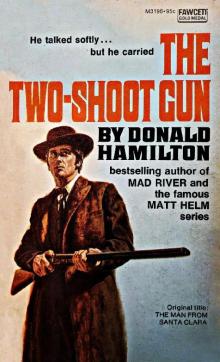 The Two-Shoot Gun
The Two-Shoot Gun Mad River
Mad River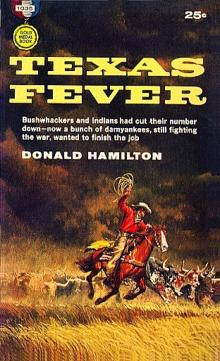 Texas Fever
Texas Fever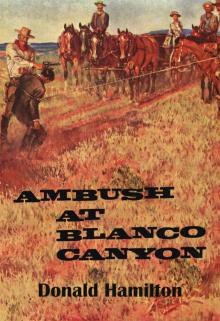 Ambush at Blanco Canyon
Ambush at Blanco Canyon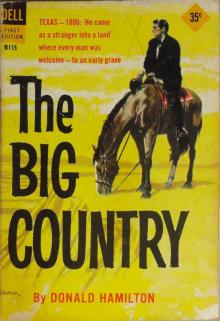 The Big Country
The Big Country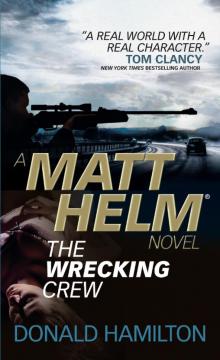 The Wrecking Crew
The Wrecking Crew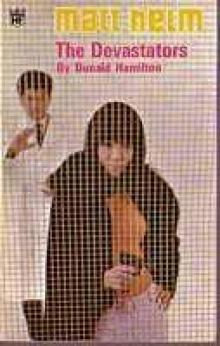 The Devastators mh-9
The Devastators mh-9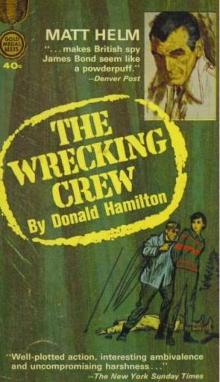 The Wrecking Crew mh-2
The Wrecking Crew mh-2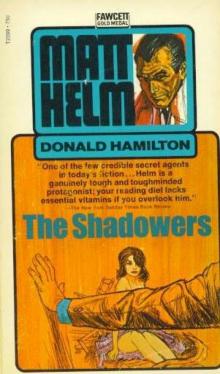 The Shadowers mh-7
The Shadowers mh-7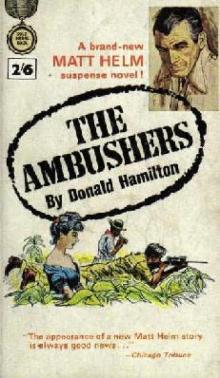 The Ambushers mh-6
The Ambushers mh-6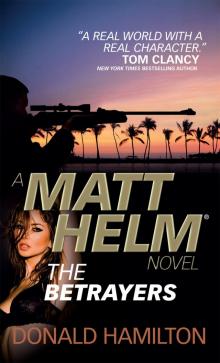 The Betrayers
The Betrayers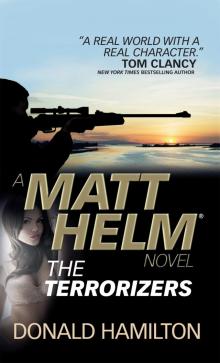 The Terrorizers
The Terrorizers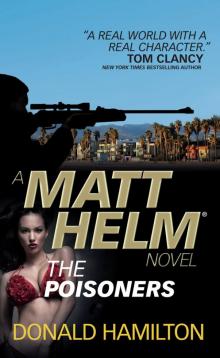 The Poisoners
The Poisoners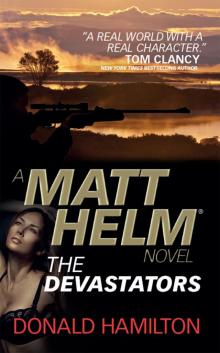 The Devastators
The Devastators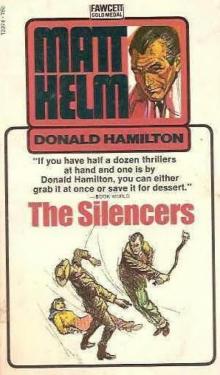 The Silencers mh-5
The Silencers mh-5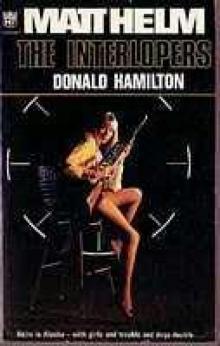 The Interlopers mh-12
The Interlopers mh-12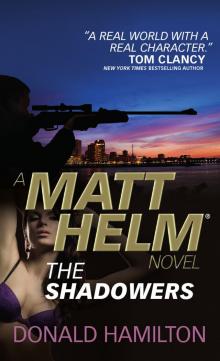 The Shadowers
The Shadowers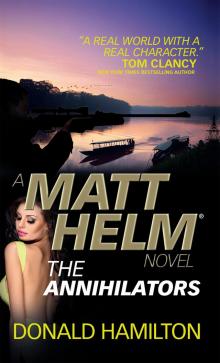 The Annihilators
The Annihilators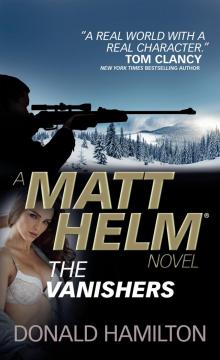 The Vanishers
The Vanishers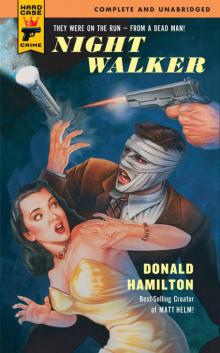 Night Walker
Night Walker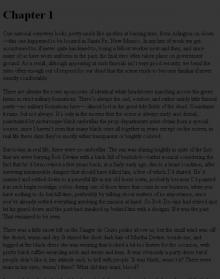 The Revengers
The Revengers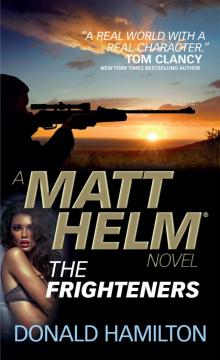 The Frighteners
The Frighteners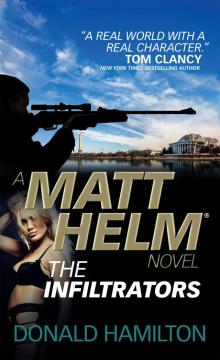 The Infiltrators
The Infiltrators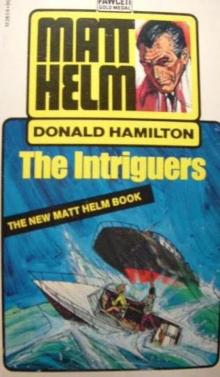 The Intriguers mh-14
The Intriguers mh-14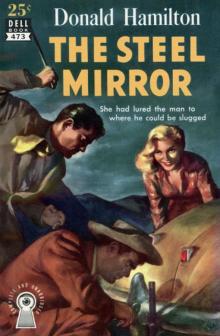 The Steel Mirror
The Steel Mirror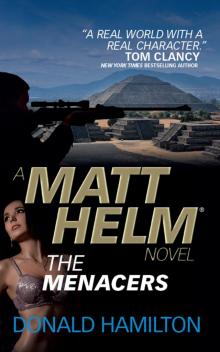 The Menacers
The Menacers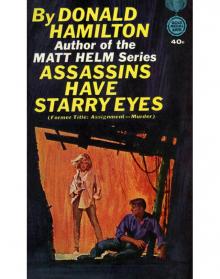 Assassins Have Starry Eyes
Assassins Have Starry Eyes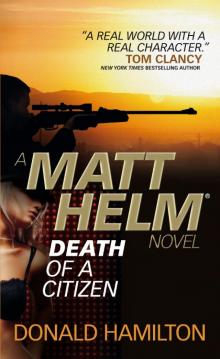 Death of a Citizen
Death of a Citizen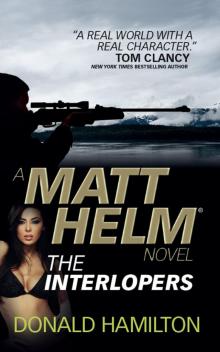 Matt Helm--The Interlopers
Matt Helm--The Interlopers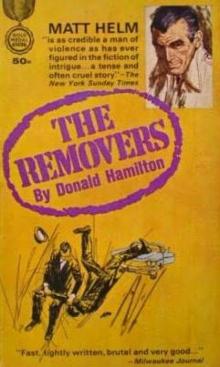 The Removers mh-3
The Removers mh-3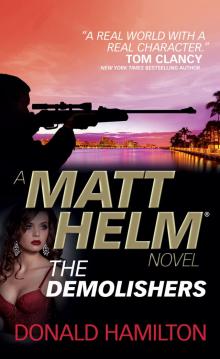 The Demolishers
The Demolishers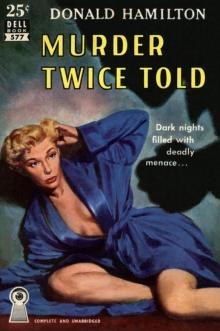 Murder Twice Told
Murder Twice Told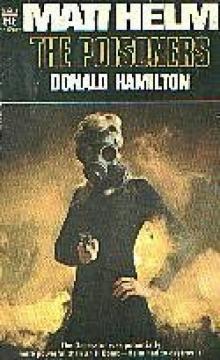 The Poisoners mh-13
The Poisoners mh-13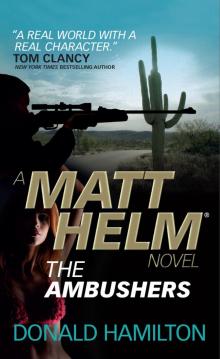 The Ambushers
The Ambushers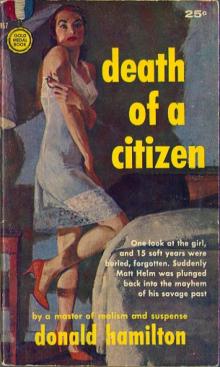 Death of a Citizen mh-1
Death of a Citizen mh-1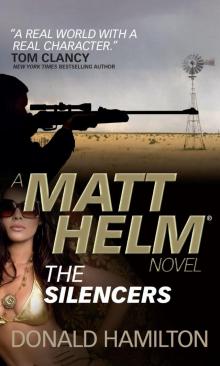 The Silencers
The Silencers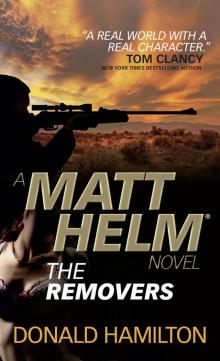 The Removers
The Removers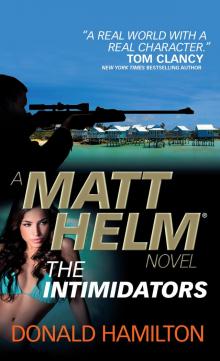 The Intimidators
The Intimidators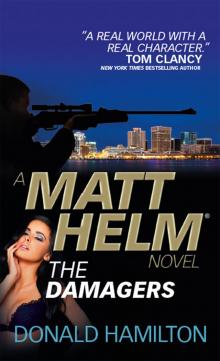 The Damagers
The Damagers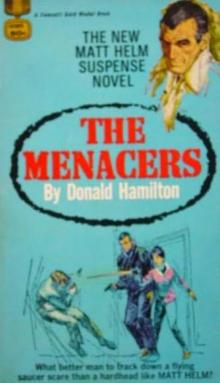 The Menacers mh-11
The Menacers mh-11 The Retaliators
The Retaliators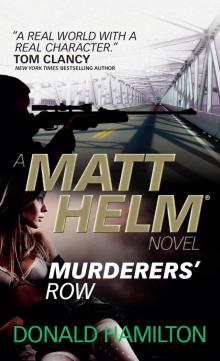 Murderers' Row
Murderers' Row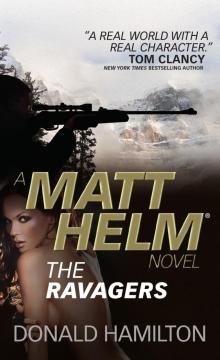 The Ravagers
The Ravagers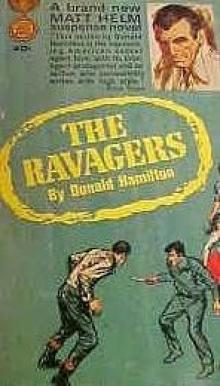 The Ravagers mh-8
The Ravagers mh-8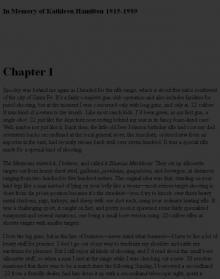 The Threateners
The Threateners The Betrayers mh-10
The Betrayers mh-10